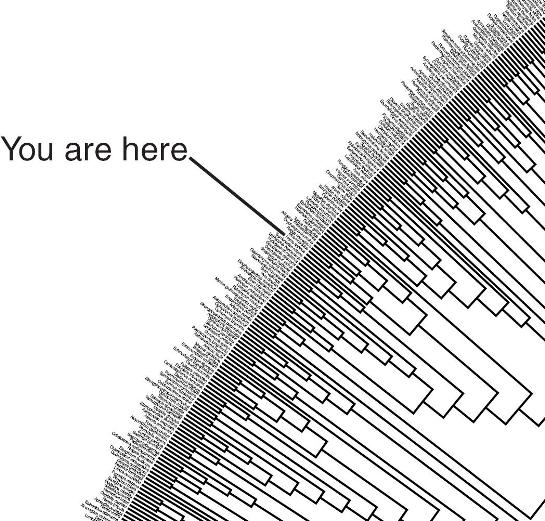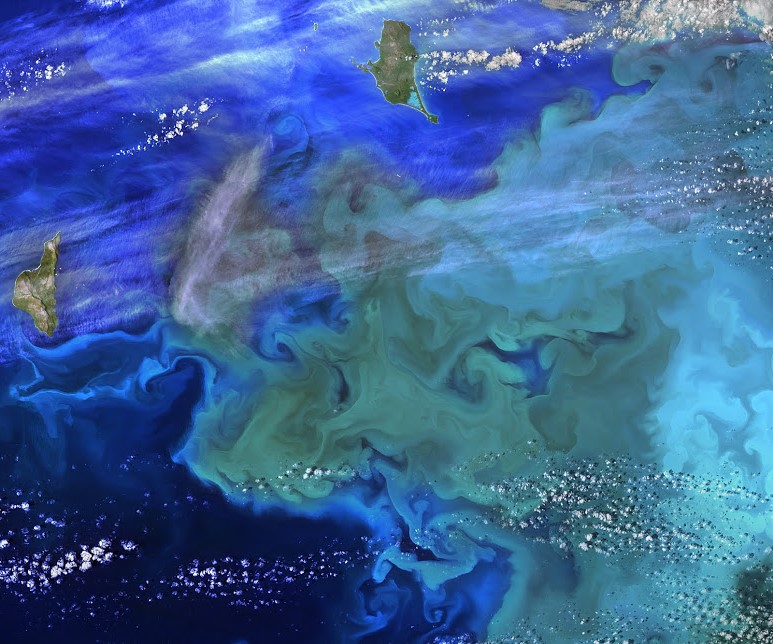File:In the smallest creatures god.png: Difference between revisions
Siterunner (talk | contribs) No edit summary |
Siterunner (talk | contribs) No edit summary |
||
| Line 26: | Line 26: | ||
[http://www.tinybluegreen.com '''''www.tinybluegreen.com'''''] | [http://www.tinybluegreen.com '''''www.tinybluegreen.com'''''] | ||
''It is estimated that | ''Nearly all marine plants are single celled, photosynthetic plankton-algae...'' | ||
''Plankton/phytoplankton/algae are the basis of the ocean food chain....'' | |||
''Like plants and trees on land, phytoplankton give us a lot more than food. It is estimated that '''50 to 80 percent of the oxygen in our atmosphere''' has been produced by phytoplankton. At the same time, they are responsible for drawing down significant portions of the carbon dioxide from the air. The tiniest of living organisms exert an outsized influence on the planet.'' | |||
○ | ○ | ||
| Line 42: | Line 46: | ||
<big><font color=blue>○ ○ ○ ○ ○ ○ ○</font></big> | <big><font color=blue>○ ○ ○ ○ ○ ○ ○</font></big> | ||
''' | '''Phytoplankton''' | ||
Phytoplankton /ˌfaɪtoʊˈplæŋktən/ are the autotrophic components of the plankton community and a key part of oceans, seas and freshwater basin ecosystems. The name comes from the Greek words φυτόν (phyton), meaning "plant", and πλαγκτός (planktos), meaning "wanderer" or "drifter" | Phytoplankton /ˌfaɪtoʊˈplæŋktən/ are the autotrophic components of the plankton community and a key part of oceans, seas and freshwater basin ecosystems. The name comes from the Greek words φυτόν (phyton), meaning "plant", and πλαγκτός (planktos), meaning "wanderer" or "drifter" | ||
Revision as of 19:12, 13 February 2016
https://en.wikipedia.org/wiki/Extinction
http://www.greenpolicy360.net/w/Tree_of_Life
○ ○ ○ ○ ○ ○ ○ ○ ○ ○ ○ ○ ○ ○ ○ ○ ○ ○ ○ ○ ○ ○ ○ ○ ○
Blue-Green in the Ocean & Life on Earth
- "A single kind of blue-green algae in the ocean produces the oxygen in one of every five breaths we take"
- ~ from "The World Is Blue: How Our Fate and the Ocean’s Are One" by Sylvia Earle
○ ○ ○ ○ ○ ○ ○ ○ ○ ○ ○ ○ ○ ○ ○ ○ ○ ○
"The Tiny Little Ones - Plankton"
- "Ecosystems of the Sea"
Nearly all marine plants are single celled, photosynthetic plankton-algae...
Plankton/phytoplankton/algae are the basis of the ocean food chain....
Like plants and trees on land, phytoplankton give us a lot more than food. It is estimated that 50 to 80 percent of the oxygen in our atmosphere has been produced by phytoplankton. At the same time, they are responsible for drawing down significant portions of the carbon dioxide from the air. The tiniest of living organisms exert an outsized influence on the planet.
○
The Smallest Marine Plants
The smallest living things from the plant kingdom living in our oceans are single-celled green algae. These tiny cousins of the redwood tree can be measured at 5 micrometers or less, about five times larger than marine bacteria but still quite small. You would have to line up 5,080 of these little plants to reach 1 inch.
○ ○ ○ ○ ○ ○ ○ ○ ○ ○ ○ ○ ○ ○ ○ ○ ○ ○ ○ ○
The Smallest of the Small: Marine Viruses
Just as on dry land, the oceans are full of millions of viruses, by far the tiniest form of life. The smallest are about 40 nanometers in diameter. To put that into perspective, if you lined these marine viruses up end to end alongside a ruler, you would have to lay down 635,000 of them before hitting the 1-inch mark. Even the largest marine viruses are only about 400 nanometers.
○ ○ ○ ○ ○ ○ ○
Phytoplankton
Phytoplankton /ˌfaɪtoʊˈplæŋktən/ are the autotrophic components of the plankton community and a key part of oceans, seas and freshwater basin ecosystems. The name comes from the Greek words φυτόν (phyton), meaning "plant", and πλαγκτός (planktos), meaning "wanderer" or "drifter"
https://en.wikipedia.org/wiki/Phytoplankton
○
Zooplankton
Drifting oceanic microscopic invertebrates
Greek zoon (ζῴον), meaning "animal", and planktos (πλαγκτός), meaning "wanderer" or "drifter"
https://en.wikipedia.org/wiki/Zooplankton
○
Sea Drifters (slideshow from BBC - 2010) -- http://news.bbc.co.uk/2/hi/science/nature/8498786.stm
Close up images of plankton, the tiny creatures that hold the key to survival in the world's oceans
File history
Click on a date/time to view the file as it appeared at that time.
| Date/Time | Thumbnail | Dimensions | User | Comment | |
|---|---|---|---|---|---|
| current | 15:44, 26 September 2015 | 748 × 149 (232 KB) | Siterunner (talk | contribs) |
You cannot overwrite this file.
File usage
The following 6 pages use this file:

